Ajax Minor's Blog, page 9
March 26, 2018
Brazil: Memories and Reflections
Disembarking I noticed soldiers everywhere, armed with automatic weapons and wearing jack boots.
Last week we addressed North Korea again, since it is topical and is the setting for Part 1 of ‘The Girl from Ipanema‘. This week I’d like to revisit, in my own mind’s eye, Brazil, the country that provides the locale for Part 2 of ‘The Girl from Ipanema’ (#TGFIbook) as well as the title of the book.
 I first went to Brazil in 1975 and visited Rio, Sao Paolo and Brasilia, the capital.
I first went to Brazil in 1975 and visited Rio, Sao Paolo and Brasilia, the capital.
My first recollection was of airport security. Politics were messy in those days and Brazil was under a military dictatorship from 1964 through 1985. Disembarking I noticed soldiers everywhere, armed with automatic weapons and wearing jack boots.
I wasn’t shocked but it was an ominous environment. Remember that in the US those were the days when you’d park your car and dash for the Gate if you were late for your flight. No security.
All three of Brazil’s major cities that I visited made deep and different impressions.
Sao Paulo

Sao Paulo was vibrant and muscular. It seemed to me as if it had sprung full blown from the ground, a metropolis of reenforced concrete that screamed seriousness. While it was customary, as in all Latin countries, to dine late, say 10 PM, the Paulistanos were back at work early in the morning. And they were proud of the fact.
Rio

Rio was a different story. It is probably one of the most beautiful and exciting playgrounds I’ve ever visited. The beach stretched seemingly forever and was filled with young, athletic people who would play volleyball into the early morning hours.
Sitting by my balcony at the Copacabana Hotel, I’d eat luscious tropical fruit and stare at the expanse of sand across Avenida Atlantica, bordering the south Atlantic Ocean, which shimmered under the equatorial sun like a sheet of silver mylar.
At night we would drive to Ipanema, bowl duckpins and drink Brahma Chopp. Pinsetters, as in TGFI, were barefoot, their legs dangling over the polished alleys. During the day, downtown, we made our business calls. Every stop required a cup of strong cafezhino, Brazilian espresso, and the air was filled with the rich smell of churrascaria, Brazilian barbecue.
Brasilia
 And I visited the capital, Brasilia, located deep in the tropical forest. Flying into the city, I was struck by the color of the soil. Bright red-orange. I thought it must be iron but it was bauxite, from which aluminum is extracted. Brasilia itself was a visionary city of the future, its buildings a modern twist on classical style.
And I visited the capital, Brasilia, located deep in the tropical forest. Flying into the city, I was struck by the color of the soil. Bright red-orange. I thought it must be iron but it was bauxite, from which aluminum is extracted. Brasilia itself was a visionary city of the future, its buildings a modern twist on classical style.
Most unusual of all was the flight from Brasilia to Rio. I heard someone speaking in a language I couldn’t recognize. Much like French but different in its own way and, I thought, more beautiful to the ear. Of course, it was Carioca, the dialect of Rio. It was laced with ‘schwa’ sounds, like seafoam left on the beach by a breaker.
I’m not sure which was more lovely, the women of Rio or its language. No matter. I got to enjoy both!
The post Brazil: Memories and Reflections appeared first on Ajax Minor.
March 17, 2018
Rocket Man V Ramblin’ Man Redux
So much has been made this week of Mueller and McCabe and Stormy Daniels the mind boggles. But unlike previous administrations we keep being distracted by sideshows rather than focusing on important policy issues. And none is more important than the relationship between the DPRK (Democratic People’s Republic of Korea; aka North Korea) and the US.
The fact that the countries’ two leaders may meet is remarkable. I have to commend Kim for extending the offer and Trump for accepting. I doubt anything immediate and substantive will result but it never hurts to talk. As my ‘leftie’ friends like to say, “give peace a chance”. Now, I’m on the left side of the 50 yard line but we have to be realistic. One element that’s crucial to understand is that reason works on reasonable people and often we are dealing with psychopaths or sociopaths. Assad, Hussein, Karadzic. The list goes on. But it’s worth the shot. However, it’s also key to manage expectations by understanding the personalities of the principals.
For that reason I’m going to forget about Stormy for a moment and repost a blog I wrote a few weeks ago:
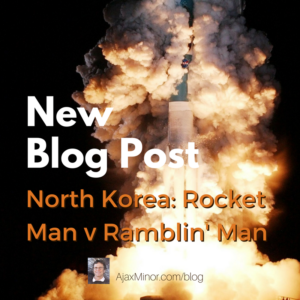 North Korea is an issue I should address, since the first part of ‘The Girl from Ipanema’ takes place in the DPRK. Well, I needed a country that has an authoritarian system so it would be easier for the main characters to exercise ‘extreme prejudice’, as they say, with few constraints. The DPRK is topical and, with a fair degree of understatement, controversial. Bottom line, I thought it would be fun. It did raise some hackles. One reader, who very much liked SVMM, was offended by the North Korean fighter jet on the jacket cover. And he was Canadian!
North Korea is an issue I should address, since the first part of ‘The Girl from Ipanema’ takes place in the DPRK. Well, I needed a country that has an authoritarian system so it would be easier for the main characters to exercise ‘extreme prejudice’, as they say, with few constraints. The DPRK is topical and, with a fair degree of understatement, controversial. Bottom line, I thought it would be fun. It did raise some hackles. One reader, who very much liked SVMM, was offended by the North Korean fighter jet on the jacket cover. And he was Canadian!
I also wanted to color the DPRK with a hopeful hue. The subtle message was that perhaps at some time in the future, or maybe in an alternative reality, a leader with qualities like Jumong might emerge to lead the country into the light. In my mind, there is good precedent with Lee Kwan Yew, who led Singapore to prosperity and a degree of freedom with an iron, though enlightened, fist.
Jumong and his evil twin, Kang, present an interesting juxtaposition. While Kang is manipulative and, one might say, a bit of a psychopath, he is also a realist who knows it is only Jumong the people will follow. Jumong, though far more thoughtful and empathetic, lacks the drive and ruthlessness to feel at ease running the whole show. But both seem to care, in very different ways, about their country.
What about the two individuals currently locking horns, Kim Jong-un and the Donald? Are they psychopaths, sociopaths or really geniuses playing three dimensional chess while everyone else is playing checkers? I’m going to exercise editorial privilege and rule out the ‘genius’ thing. Kim certainly seems to have the credentials to lay claim to being a psychopath, if reports of his liquidations are true.
There are a number of articles that can be Googled on psychopathy and political leaders, CEOs and generals. So many I leave it to the reader to choose their own. But the point has been made that one of the characteristics held in common by all three of the classes mentioned is their propensity to view people as objects who exist only for their own aggrandizement. I think both Kim and the Donald probably share this trait in common.
But I’d like to make an additional point about Trump that hasn’t been raised. He came in heralded as a businessman that could straighten the country out, rather than having it run by bureaucrats and a bunch of ‘First thing, kill all the’ LAWYERS’. But the distance that separates Trump from, say, a Rex Tillerson may be wider than that which separates either from the professional class. Trump IS a businessman but not a corporate exec. He has been a sole proprietor. Now Sole Proprietors are different ducks. And I know. Both my father and my father-in-law were effectively sole proprietors. Sole Proprietors answer to no one. They have absolute power and often exercise it. Many are also tyrants. They rule by fear. My father would sometimes rule by reason and at other times would take a problem employee out back for a good right cross. My father-in-law didn’t resort to physical coercion but would belittle, berate and leave those who worked for him never sure they had made the right decision and always afraid they’d made the wrong one. ‘Wrong’ being defined as a choice their boss didn’t like. Tyrants like to keep their minions off balance.
So neither Trump nor Kim may be chainsaw wielding psychopaths (yet), but either have been or behave as if they have been tyrants and sole proprietors.
The post Rocket Man V Ramblin’ Man Redux appeared first on Ajax Minor.
March 12, 2018
Black Panther and ‘The Girl from Ipanema’
Humans have an enormous capacity for greed and violence. But also a capacity for love.
Last week Linda and I went to see ‘Black Panther’. It was, like ‘Wonder Woman’, refreshing. Refreshing because of the historical setting of ‘Wonder Woman’, World War I, and the ancient African imperial culture in ‘Black Panther’, but also because it showcased a female and a black superhero, respectively. Interestingly, I appreciated its relevance to my book, ‘The Girl from Ipanema’.
Say what?
‘Wonder Woman’s’ connection was pretty obvious, given my own emphasis on female characters with both special powers and ‘grit’. But ‘Black Panther’? It turns out that a deep subtext in that movie was the ethical dilemma of Wakanda, a nation possessed of a priceless resource, the metal Vibranium. Its uses ranged from military to medical and made Wakanda the world’s most advanced nation. But Wakanda was not interested in sharing its secret.
Withholding such technology presented the ethical dilemma. Sharing it would prove of enormous benefit to the planet, especially those individuals and countries that were disadvantaged. But it would also make Wakanda an object of envy and a target. The Wakandans rationalized the hoarding of Vibranium technology as necessary, so it wouldn’t fall into the wrong hands and prove more destructive than constructive.
Well, I’ll let it go there because ‘no spoilers here’.
But the parallel with TGFI is striking, on a moral level. The North, represented by the developed countries, gets the very short end of a very sharp stick when ecological catastrophe strikes. And the tables of power are turned. The North desperately needs the resources of the Southern Hemisphere, primarily commodities like fuel and foodstuffs. And the South needs the North’s tech. But old resentments die hard and what should be an easy deal becomes a war.
Maybe the Wakandans were right after all.
The evils of sharing may supersede the benefits. Humans have an enormous capacity for greed and violence. But also a capacity for love. So which will dominate the action, in the ‘Ur Legend’ and ‘Black Panther’? Read Book 3, coming later this year, ‘Kutusov’s Dream’ and by all means catch the sequel to ‘Black Panther’!
The post Black Panther and ‘The Girl from Ipanema’ appeared first on Ajax Minor.
March 4, 2018
For Parkland 2: Grief has a Beginning but does it have an End?
Katie would have been 26 last month. There is truth in the expression that Time heals all wounds.
There is an intellectual side to Grief. We explored that last week in a repost of Grief, God and Lao Tsu. When tragedy strikes we always ask why. I hope there may have been the beginnings of some answers from Rabbi Kushner and Lao Tse there.
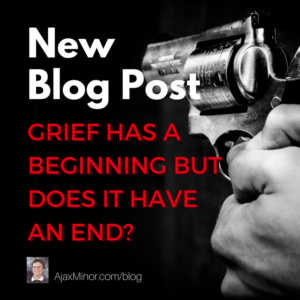 This week we discuss the emotional process and dealing with Grief in our daily lives. What the loved ones of those who died in the massacre in Parkland, FL had to endure is unspeakable but not unique. Not unique because of the endless string of shootings over the past few years but because we all have suffered the loss of friends and family in our lives. Even the loss of one person sets in process the same emotional and intellectual responses.
This week we discuss the emotional process and dealing with Grief in our daily lives. What the loved ones of those who died in the massacre in Parkland, FL had to endure is unspeakable but not unique. Not unique because of the endless string of shootings over the past few years but because we all have suffered the loss of friends and family in our lives. Even the loss of one person sets in process the same emotional and intellectual responses.
Grief is perhaps the most brutal of emotions. Not because it is more intense than others. Certainly fear can be more immediately overwhelming. But Grief is a chronic state. It is a response to Loss. Not simply the loss of a wallet, or a set of keys, but something irreplaceable and irretrievable. The object of that Loss is usually, though not always, the death of a living and loved soul. While anger, as an example, is explosive, Grief is implosive. It digs its nails into your very surroundings, the air you breathe, then into your skin and collapses every scrap of being to a point in your core that is the seat of your Self. It is a reaction to tragedy that is ripping in its intensity. It is emotional fusion, not fission, and it crams the self into a space so dense that you cannot help but be sucked in.
The question then becomes, can you crawl out of grief? The answer is yes. But it will draw on all of your emotional and intellectual resources. It will make you reach back and grope for strength in your personal history. It will challenge you and reshape your beliefs about the world and about yourself.
My wife, Linda, and I, as most of you know who follow this blog or have read my books, lost our daughter, Katherine, to a birth accident. It appeared that her umbilical cord had been too short, and when she turned it cut off the supply of oxygen to her brain. Ghastly.
Katherine died seven months after birth. The spaces that filled her brain, left by tissue that had been starved of oxygen and had died, filled with dense spinal fluid and simply became more than her brainstem, seat of the autonomic functions, could bear. Her heart just stopped.
Katie would have been 26 last month. It’s said that Time heals all wounds. There is truth in that expression. For the first few years after her death we would always open the morning of February 12 with the comment: ‘It’s Katie’s birthday’. Then, maybe a decade ago, one of us mentioned her birthday and the other exclaimed: ‘I forgot!’. Did we care any less? NO. But Time does lessen the pain, even if it does not eliminate it.
What did we do in all of those intervening dates between birthdays? Her life had ended, but ours had not. We had to live. But how? First was to answer the question ‘why?’. For us we found an answer in the words of an ancient Asian sage, Lao-Tse:
‘Nature does not play favorites. She regards her creations without sentimentality.’
Others seek comfort in God, some unfortunately in drugs and alcohol. Because there is no good answer to the question, ‘why?’.
Linda and I had to get in synch emotionally. If you are a parent, you will have to confront this fact. Grieving is differential. Highs, if there are any, usually are just a brief respite; and lows are rarely coincident in time. People grieve, as people walk, at their own pace. Linda had sat up every night while Katie was alive and poured her heart and her guts out in a flood of tears. I had simply been ‘dad’. But after Katherine died it was time for me to start to comb through the catastrophe for some meaning. Linda was ahead of me and because of love, she waited patiently for me to catch up. Understand, the pain never goes away completely. Ever. But our stoic view helped us. That and, surprisingly, black humor. Some of us need bluebirds and some of us like blackbirds, I guess.
Linda and I had taken Katie to a school for blind children, infant to pre-school. Since she was so horribly compromised, the therapy there and at home probably did us more good than it did her, as we massaged her tortured muscles and sat in a dark room while colored lights blinked away on a small device.
Then, Linda took her considerable financial skills from a career on Wall Street and poured them into the school. I’d like to think her effort, over fifteen years, did some good. I, on the other hand, had a flash of inspiration. I decided to write a story. The short story became a long novel that eventually became a series of novels. I gave my daughter a life in them that she’d been robbed of. Of course, they were fantasy, so I could actually give her life on the page. That’s the beauty of fantasy. One can fashion make believe and make it believable.
So the question becomes, can art be a balm for Grief and if so how?
There are countless instances of art dealing with the subject of grief.
Sculpture: the Pieta and a Mother’s outpouring of not only grief but also love into the dead body of her son, in a gesture of pure ‘agape’, unconditional love.
Plays: Trojan Women by Euripedes, exploring the grief of women who have lost sons, husbands and their home; Grief in bitter resignation.
Books: the Mockingjay series, Grief transformed into action. And Uncle Tom’s Cabin, Grief shaped by love.
Poetry: Galway Kinnell’s ‘Neverland,’ Grief expressed as helplessness.
An English teacher of mine in high school wisely noted that there is no ‘correct’ interpretation of a work of literature, or of any work of art, for that matter. Because there is the artist’s intent and the inferences made by the audience. Both are valid.
In my art, my books, Grief morphed into joy. The joy of fashioning a life out of words. I am still astounded, when I read certain passages of Sun Valley Moon Mountains, what a special person ‘my daughter’ Ur is. And I am even more moved by her as a young woman in The Girl from Ipanema.
I write with an old fashioned fountain pen because it moves effortlessly across the paper, never tiring my hand, as my mind pours out thoughts that are soaked in ink and the nib glides across the page.
But what of my audience? What’s in it for them? As much as I have wanted to create another existence for Katie, I’ve also tried to show people, especially those who can empathize with our Grief, that there is another way of viewing the tragedy as a function of a universe that is not malevolent, nor even cold, but simple a universe that ‘is’. The ‘why?’ of it all need not be an instrument of torture.
So my advice to those who are members of our grisly club is to stop asking ‘why?’, because there is no satisfying answer; but to pick up a brush and some paints and a canvas, or a piece of chalk, or a lump of clay, or a pen. Pick up a block of wood and fashion it, if you have that talent. Or simply open a recipe book and cook, if that’s a talent that moves you. Or open an Excel spreadsheet, as Linda did, and give back. As Achilles said to Priam, who came seeking the body of his son, Hector, in the Iliad, “eat”, for the living, as much as they grieve their loss, must still get on with the business of living.
I would like to close with one more thought, which sustained Linda and me:
First, things could always be worse.
And Second, there is always someone who has it worse than you do.
The post For Parkland 2: Grief has a Beginning but does it have an End? appeared first on Ajax Minor.
February 26, 2018
For Parkland: God, Grief and the Tao te Ching
How does one deal with a crushing loss, such a losing a child, a loved one or a friend? The kind both Kate and Jaq (In “Sun Valley, Moon Mountains“), and Linda and I did in real life, when our daughters died.
A lot depends on personal history and the predilections of one’s personality.
Why?
Of course the first question asked is, ‘Why?’ First you may point the finger at yourself. ‘What did I do cause this horrible thing to happen?’ or ‘What could I have done to avert this catastrophe?’
Usually, the answer doesn’t lie in taking blame. If the loss is directly your fault, it will probably be a long road to recovery. And I’m not a professional so we’re not going there.
God’s Will
In most cases the tragedy just ‘happened’. But how can that be? Is the universe that indifferent? Maybe, maybe not. But you grind through the question in search of meaning. Of course, God usually gets brought into play. If one is devout, both an answer and solace may be found by invoking ‘God’s will’ and reconciling to the fact that the mind and intentions of an omniscient being are beyond human understanding.
But this doesn’t work for everyone. You can be a believer in God’s omnipotence and then get pretty pissed at Him/Her as a result. The event can drive a believer away from the comfort of trusting in a benevolent and loving creator.
Personal Background
For Linda and me, we came from different histories. Linda is/was a Presbyterian and attended church regularly with her family until college. She even had a pin for participating in choir for 12 years! But she began to have doubts when, as a banker whose territory was Latin America, she saw poverty on a scale unimaginable in the US. ‘Why’, she asked, ‘would a benevolent God let this happen?’
I had a different history. Most of my family were socialist atheists who immigrated to the US early in the last century from Iraq, Poland and Wales (some mutt huh?). They had seen the seamy side of religion and rejected it. Curiously, my maternal grandma (Grannnie Jen in SVMM) was an old Connecticut Yankee and staunch Congregationalist. Oddly, I was closer to her than all of my other grandparents but, even though I attended church on and off from childhood through the time when our Katie was born, I never heard the ‘calling’.
But you know what? When this kind of mess happens, everyone questions God’s involvement. as the saying goes, ‘there are no atheists in foxholes’, and God is put on the spot when unthinkable tragedy occurs. WHY?
Lao Tse
No matter our personal history or intricately constructed belief systems, we still question God’s role. Both Linda and I did. And we became comfortable with the idea that, as Lao Tse said: Nature does not play favorites. She regards her creations with out sentimentality.
And so we came to believe that the universe was not cold or impersonal by choice but rather fundamentally in its design. Like Kate and Jaq, we adopted a Stoic worldview. It fit with personalities that were fundamentally rational. This is not to say that is superior to those that are more emotional in nature. It’s just a fact, not a judgement.
When Bad Things Happen to Good People
But as to God and those who cannot let go of the notion of involvement by a supreme being, I would recommend a wonderful book: When Bad Things Happen to Good People by Rabbi Harold Kushner.
I will summarize.
God is often thought of as omniscient, omnipotent and loving. Kushner’s conclusion was that he can be two of three but not all three at once. There is comfort, I think, in that idea.
What do you think?
The post For Parkland: God, Grief and the Tao te Ching appeared first on Ajax Minor.
February 19, 2018
Las Vegas: Again
What does the Second Amendment have to do with my book, “The Girl from Ipanema?”
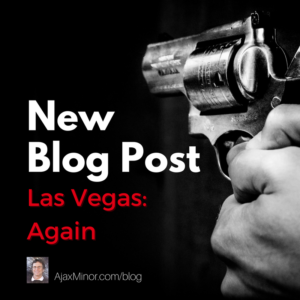 Sadly, I have to reprint a blog I wrote after the Las Vegas massacre. Here we are again. There is, ultimately, a tradeoff between Liberty and Security. I’m not sure it’s correct to judge the emphasis as either right or wrong. And I’m not an ethical relativist. There are, simply, people who wish to live in very different social and political cultures. I feel our differences may be irreconcilable and that we might end up like the USA I describe in my novel, ‘The Girl from Ipanema‘. Would that be all bad? Sometimes it’s time to call a relationship a mistake and move on.
Sadly, I have to reprint a blog I wrote after the Las Vegas massacre. Here we are again. There is, ultimately, a tradeoff between Liberty and Security. I’m not sure it’s correct to judge the emphasis as either right or wrong. And I’m not an ethical relativist. There are, simply, people who wish to live in very different social and political cultures. I feel our differences may be irreconcilable and that we might end up like the USA I describe in my novel, ‘The Girl from Ipanema‘. Would that be all bad? Sometimes it’s time to call a relationship a mistake and move on.
Anyway, a redacted redux:
This blog is not a place to muck around in current events; there is plenty of that out there already. I usually write about theoretical or general issues rather than topical. However, when current events are related to my work, I feel there is justification in publishing my thoughts related to what’s going on.
For example, since women are prominent in my work, I’ve written about Women in Sports and the #MeToo movement. (Solheim Wonder Women, Wonder Women in Sports Broadcasting, and Wonder Women and #MeToo)
Once again, I believe that current events are relevant to my fantastical fiction—especially the recent shooting in Florida and the subsequent debate about gun rights, with respect to my second book, “The Girl From Ipanema”—and I wanted to write about that here.
What does the Second Amendment have to do with my book, “The Girl from Ipanema?”
The Girl from Ipanema is set partly in a ‘World turned Upside Down’ (hence the subtitle), by an ecological catastrophe. After the Apocalypse, necessity forces a rupture in the political geography of the USA. Boundaries are drawn based on both economics and culture. Some of the new divisions are known as:
the Rocky Mountain Republic;
the New Confederate States;
the Republic of New York and Venice;
and others.
Could such a thing happen here?
A Deep Philosophical Divide
Yes. There have been cries for secession from such politically polar opposite places as Texas and California. But there is a deeper reason. THE United States of America almost didn’t happen at all. In fact, we were initially referred to as THESE United States. Ratification of the Constitution, though unanimous among the original thirteen colonies, was a closer run thing than is widely known. An excellent book on the subject is Pauline Maier’s Ratification.
There has always existed a deep philosophical divide between the proponents of States’ Rights and a central Federal authority. This tension was very much at the root of the problems that resulted in the Civil War and that same tension exists to this very day.
Which brings us to the Second Amendment, a touchstone for both sides of the political divide and symbolic of the wide gulf that still separates us in America. Once again, sadly, we have had to talk about gun rights and gun violence in the aftermath of the Florida massacre.
We are more divided today than at any time since the period leading up to the Civil War. Certainly, differences were expressed more violently during Vietnam, but once the last chopper took off from the rooftop of the American Embassy in Saigon, it felt as if much of the raw animosity took off with it. Today, polarization goes deeper and reflects a difference in philosophy dating back to ratification, as I have said.
One solution would be to declare the American Experiment a qualified success (or failure) and hold a Constitutional Convention to redraft a governing document. Not ready to go there? We might at least think of rewriting the Second Amendment to once and for all establish gun ownership as an individual and inviolable right and, at the same time, set well defined and reasonable limits on firearms.
What is wrong with the Second Amendment?
What is wrong with the Second Amendment anyway? Let’s focus for a minute on form rather than substance.
The Constitution proper is one of the driest, and therefore most clearly written documents in our history. Only the General Welfare Clause, in Article 1.8, has any wiggle to it; and for reasons explained obliquely by Hamilton in Federalist 34.
However, while some of the Amendments are a bit more syntactically muddled than the Constitution proper,The Second Amendment is probably the most poorly written. Is ‘militia’ part of a list or is it a qualification? Who knows? The Supreme Court waffles over time. Neither gun control nor gun rights advocates should feel comfortable with the language.
THE SECOND AMENDMENT
A well regulated Militia, being necessary to the security of a free State, the right of the people to keep and bear Arms, shall not be infringed.
However, it occurs to me that recent events have put its broadest interpretation, by the N.R.A, into conflict with another part of the Constitution proper. The Preamble, in which it is stated that one of the purposes of the document is to ‘insure domestic Tranquility’. It is true that only one case, ‘Jacobson v Mass (1904)‘, directly based a claim on the Preamble; and it has often been stated that the Preamble has no substantive power. That it is not a statement of Law. Perhaps not but it is, at the very least, an issue of equity, in the legal sense.
Perhaps it is time to reconsider the Preamble.
Domestic Tranquility is in Dire Jeopardy
The Founders were disciples of Hobbes and Locke and Rousseau in believing that the purpose of the Social Contract was to protect individuals against direct threats to their persons and property resulting in the State of Nature.
I believe the Preamble is the foundation upon which sits the entire structure of the American Social Contract and that ‘domestic Tranquility’ is in dire jeopardy.
So do we go down the road followed by the United States in “The Girl From Ipanema,” or bite off a small piece of the problem, the Second Amendment, fix it, and figure out a way to swallow it?
The post Las Vegas: Again appeared first on Ajax Minor.
February 12, 2018
Letters to a Young Writer by Colum McCann: Some Thoughts
I bought Colum McCann’s book, ‘Letters to a Young Writer’, after watching a spot on PBS Newshour hosted by Jeffrey Brown. Am I a young writer? Depends. McCann says at one point ‘who cares how old you are?’, and that his ‘Letter’ could be to any writer. I must agree. I began to write fiction in my forties and recently published the first two books in a three book series, ‘The Ur Legend’. I’m on Medicare so this book must certainly have been for me as well as twenty-somethings.
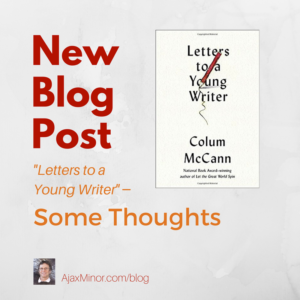 Themes of the Book
Themes of the BookI’d like to offer up a few comments on the themes covered. First, though, let me say that there were a few times when the book made me smile. Or chuckle. Specifically, when it mentioned the word ‘advance’, as in money, and then asserted that ‘finding an agent isn’t all that difficult’. C’mon! The fact is I’m an Indie author and the rules of engagement are different for us than for those with MFAs. But Colum should know that since he declined pursuing an MFA himself.
His main audience was a select club. I myself submitted a few short stories to literary magazines, fantasy of course, and was rejected. I had read many of the published submissions. Some were better than mine but some were worse. Then I checked the CVs of the authors and found them all to be graduates of writing programs. Talk about a glass, or paper, ceiling! That being said, there was much of value in McCann’s book for writers of all ages and all levels of experience.
Now I’d like to comment on a couple of metathemes and then toss out a few fun one-offs from my reading of his essays.
Importance of Structure
The first topic of importance is structure, which leads to the issue of ‘writer’s block’. I’ve never experienced it. Why, because contrary to one assertion in the book, I always know where I am going and it’s not ‘okay’ if I don’t. Before I sit down to write a short story or a section of a novel (or the entire novel for that matter), I have major signposts laid out in my head. Beginning, middle and end for a story or book, starting and endpoint of the plot for the day when I ‘put my arse in a chair’, as Colum so eloquently phrases it. I begin the day where I left off the day before and I know where I’m headed. The trick is that I never know exactly how I’m going to get from Point A to Point B. I just WRITE. If some of it is garbage it will come out on the edit (which I enjoy as much as the creative process). The babble will be deleted, or, if it happens to be decent prose or an intriguing idea, placed in my ‘sandbox’ file.
Actually, Colum McCann expressed it perfectly when he wrote:
‘The best journeys are those where we don’t know exactly what road we will take. We have a destination in mind but the manner of getting there should be open to flux.’
Later in the book he says that once in a while you have no idea where you are going. Bravo! That’s where ‘block’ comes in. It’s ‘plot block’. Often I will hit a signpost and then realize it’s pointing in the wrong direction. Often I set the manuscript down for a month or more while I consider what new direction the story ought to take. Once decided, out comes the fountain pen again and down go the words (and the ‘arse’).
Plot versus Character
The other major idea I’d like to talk about is the question of plot versus character. I like to think that it is character development that drives a story. That is what McCann calls the ‘human music’ of connection. In Joseph Campbell’s words, ‘the harmonious rhythm of relationships’, make a story work.
On that issue, McCann claims that plot is subservient to language. I found this puzzling, then it occurred to me that he might have a point. Imagine?! My favorite work in all literature is the Iliad. While I read Latin, I never took Greek so I’ve had to rely on translations. I’ve read most of them and Lattimore’s is my favorite. How can you top ‘rose fingered Dawn’? And Pope’s is brilliant, even though I prefer Lattimore’s ‘grey eyed’ Athena to Pope’s ‘blue’. But to the point. There really isn’t all that much of a story in the Iliad; but the language, the human connection, the gore!, and the fickle quality of courage transfix. So maybe McCann has a point that most might not consider.
Excerpts from Master McCann
I now have a few one-offs from Master McCann:
Don’t worry about ‘wordcount’ but rather ‘wordcut’. YES! The first draft of my first book went from 222k words to 160k words working with Jeanne Cavelos, a wonderful editor, ‘book doctor’ and writer. Then we plunged form 160k to 99k with the help of John Barnes. Same great credentials as Jeanne. A good Book Doc is invaluable. They don’t do the cutting for you, they just suggest.
‘Novelists should read poets, poets should etc.’ I always keep a copy of Sylvia Plath’s ‘Ariel’ close at hand. The goal is to be poetic, to the extent it is practical, with prose. Poets express themselves in ways that make no sense when deconstructed but beyond perfect sense when done well. Plath: ‘the baby’s cries rose like bright balloons.’ Some prose writers are quite good at it. Barbara Kingsolver for one. Surprisingly, I think John Cheever did it best. Read his short stories. ALL of them.
‘One little word for dialect’. YES. I’ve created a couple of characters from Brooklyn (where I used to live, BTW). It took me a while to realize that ‘Ay’ and ‘Fugeddaboutit’ were sufficient to place the accent in the reader’s imagination.
On criticism: Always take criticism as constructive to improve your writing. And always remember that art is entertainment; which means that one thing you will never be able to do is to argue your audience into liking your work.
A funny anecdote: Colum McCann, I suspect, being a true Irishman, likes his pint. But he advises never to drink WHILE writing. Which reminds me of a funny anecdote. For those of you who follow golf you may know of John Jacobs and Gary McCord. Jacobs likes his pint, his quart and his half gallon. Anyway, one time he said to McCord:
“You know, I’ve finally figured out the problem with my golf game.”
“Great,” McCord said. “What’s that?”
To which Jacobs replied, “I’m practicing sober and playing drunk.”
That’s about it for now. Get Colum McCann’s book, ‘Letters to a Young Writer’.
The post Letters to a Young Writer by Colum McCann: Some Thoughts appeared first on Ajax Minor.
February 5, 2018
North Korea: Rocket Man v Ramblin’ Man
So you probably were all wondering when I’d get around talking about North Korea.  It’s an issue I should address, since the first part of ‘The Girl from Ipanema’ takes place in the DPRK. Well, I needed a country that has an authoritarian system so it would be easier for the main characters to exercise ‘extreme prejudice’, as they say, with few constraints. The DPRK is topical and, with a fair degree of understatement, controversial. Bottom line, I thought it would be fun. It did raise some hackles. One reader, who very much liked SVMM, was offended by the North Korean fighter jet on the jacket cover. And he was Canadian!
It’s an issue I should address, since the first part of ‘The Girl from Ipanema’ takes place in the DPRK. Well, I needed a country that has an authoritarian system so it would be easier for the main characters to exercise ‘extreme prejudice’, as they say, with few constraints. The DPRK is topical and, with a fair degree of understatement, controversial. Bottom line, I thought it would be fun. It did raise some hackles. One reader, who very much liked SVMM, was offended by the North Korean fighter jet on the jacket cover. And he was Canadian!
I also wanted to color the DPRK with a hopeful hue. The subtle message was that perhaps at some time in the future, or maybe in an alternative reality, a leader with qualities like Jumong might emerge to lead the country into the light. In my mind, there is good precedent with Lee Kwan Yew, who led Singapore to prosperity and a degree of freedom with an iron, though enlightened, fist.
Jumong and his evil twin, Kang, present an interesting juxtaposition. While Kang is manipulative and, one might say, a bit of a psychopath, he is also a realist who knows it is only Jumong the people will follow. Jumong, though far more thoughtful and empathetic, lacks the drive and ruthlessness to feel at ease running the whole show. But both seem to care, in very different ways, about their country.
What about the two individuals currently locking horns, Kim Jong-un and the Donald? Are they psychopaths, sociopaths or really geniuses playing three dimensional chess while everyone else is playing checkers? I’m going to exercise editorial privilege and rule out the ‘genius’ thing. Kim certainly seems to have the credentials to lay claim to being a psychopath, if reports of his liquidations are true.
There are a number of articles that can be Googled on psychopathy and political leaders, CEOs and generals. So many I leave it to the reader to choose their own. But the point has been made that one of the characteristics held in common by all four of the classes mentioned is their propensity to view people as objects who exist only for their own aggrandizement. I think both Kim and the Donald probably share this trait in common.
But I’d like to make an additional point about Trump that hasn’t been raised. He came in heralded as a businessman that could straighten the country out, rather than having it run by bureaucrats and a string of ‘First thing, kill all the’ LAWYERS. But the distance that separates Trump from, say, a Rex Tillerson may be wider than that which separates either from the professional class. Trump IS a businessman but not a corporate exec. He has been a sole proprietor. Now Sole Proprietors are different ducks. And I know. Both my father and my father-in-law were effectively sole proprietors. Sole Proprietors answer to no one. They have absolute power and often exercise it. Many are also tyrants. They rule by fear. My father would sometimes rule by reason and at other times would take a problem employee out back for a good right cross. My father-in-law didn’t resort to physical coercion but would belittle, berate and leave those who worked for them never sure they had made the right decision and always afraid they’d made the wrong one. ‘Wrong’ being defined as a choice their boss didn’t like. Tyrants like to keep their minions off balance.
So neither Trump nor Kim may be chainsaw wielding psychopaths (yet), but either have been or behave as if they have been tyrants and sole proprietors.
The post North Korea: Rocket Man v Ramblin’ Man appeared first on Ajax Minor.
January 22, 2018
North versus South and Sh**holes
Last week I said that we would talk about the great ‘Sh**hole’ moment. Or was it ‘Sh**house’? No Matter. The profanity is really not the main point. There is no argument that he was ‘tough’ on some areas. The issue is whether specific countries or regions or continents have populations that are inferior to others by certain metrics.
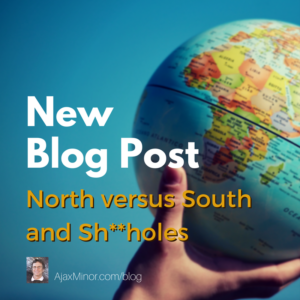 Why this is important in the context of my novels, is that ‘The Girl from Ipanema’ and the next to be released ‘Kutusov’s Dream’ deal with a world in which an ecological catastrophe has occurred and the economic shoe is on the other foot. The Northern Hemisphere is suffering from a deep freeze.
Why this is important in the context of my novels, is that ‘The Girl from Ipanema’ and the next to be released ‘Kutusov’s Dream’ deal with a world in which an ecological catastrophe has occurred and the economic shoe is on the other foot. The Northern Hemisphere is suffering from a deep freeze.
So issue relevant to both my novels and the President’s statements is, how do we view the Northern and the Southern hemispheres of the planet?
Globalization
In the late 90s, during a decade of relative peace and prosperity in the developed world, there was a legitimate concern that the less developed nations, most in the Southern hemisphere, were falling so badly behind economically that the differential posed a serious threat to stability on the planet. Then something unexpected happened. Globalization, a truly Capitalist phenomenon, lifted countless millions out of extreme poverty. The following graph comes from “Global Income Inequality in Numbers: In History and Now” by Branco Milanovic, page 202, Figure 4.
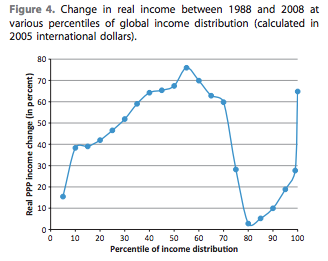
Note: the vertical axis shows the percentage change in real income, measured in constant international dollars. The horizontal axis shows the percentile position in the global income distribution. The percentile positions run from 5 to 95, in increments of five. The top 5 per cent are divided into two groups: the top 1 percent, and those between the 95th and 99th percentiles.
Notice the stunning change in income for the lowest 60% of the population, and also the rise in income for the highest 20%. So problem solved, right? Not so fast. Notice the huge decline in income increases for the slice of the population between the 60th and 80th percentiles, which of course explains why we’ve had such a backlash from that class in the form of increased populism and nationalism.
Not Exactly ‘Sh**holes’
But the point, apropos Trump’s remarks, is that perhaps the less developed counties to the south are not exactly ‘Sh**holes’, or whatever you want to call them.
But to further illustrate the point that the inhabitants of the continent of Africa are not pariahs, check out the links below. (Actually, some great reporting has made my job easy.)
First, from the Houston Chronicle, not exactly deep in Blue country, is an article stating that Nigerians, while a small immigrant community in America, actually have the highest percentage of people with a tertiary education; i.e., beyond high school, in the US. My wife, Linda, mentioned this report and I dug it out on a search. I felt pretty proud of myself.
And there’s more.
Nicholas Kristoff, a regular contributor to the editorial page of the ‘failing’ New York Times, dug out an astounding number of facts about the ‘Dark Continent’. While Kristoff is, like me, on the left side of the 50 yard line, he ALWAYS backs up his arguments with facts. Boy, does he ever.
Having read Kristoff’s piece it doesn’t get any more obvious that appearances can be deceiving. Now I know that identity politics is now a big deal.
All I can say is that I’m a Mutt.
My paternal grandad came from Baghdad, which explains the references to Mesopotamia in ‘Sun Valley Moon Mountains.’ My paternal grandmother’s family came from Poland. Definitely ‘Sh**holes’ in their day.
My mom’s dad came from Wales, so I guess he gets a pass, even though he was a socialist, and her mom was an old Connecticut Yankee. Things didn’t turn out so badly for me or the good old USA with those migrations.
Tell your story here or on Twitter: #MuttNation.
The post North versus South and Sh**holes appeared first on Ajax Minor.
January 15, 2018
Wonder Women and #MeToo
The #MeToo tidal wave has caused men to begin to rethink their view of women. Even those of us who have not been offenders. Last summer, as part of my first campaign following the release of ‘The Girl from Ipanema‘, I was asked to contribute essays to several online sites. The following was to have appeared in MomFuse:
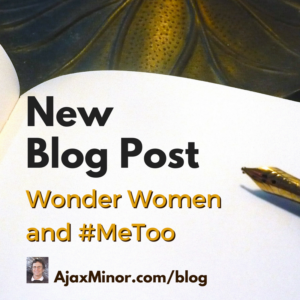 Wonder Women
Wonder WomenMy wife, Linda, delivered our daughter in February of 1992. Katherine suffered a catastrophic birth accident and died seven months later from complications. Grief took us down different paths, which is quite common. And most of our energy, during Katie’s short life, was devoted to caring for a damaged child. But after her death, we began to emerge from a deep dark tunnel and blink at the light of the living world around us.
Linda devoted her considerable financial skills, acquired during a career on Wall St., to a school for blind children in Denver where Katie had been a ‘student’. I, on the other hand, got up from a nap on a bright, cold Colorado winter’s day, with Linda sleeping soundly beside me, and began to pen a short story about the rescue of a child, who had died, from an ancient being. The short story has become a series of three novels comprising The Ur Legend, of which the first two have been published. Writing, I’ve found, is not about making the time or having the skill, but finding the reason.
I wanted to give Katie a life, as Ur, she hadn’t had the chance to live. Fantasy is a great genre for making the impossible possible. So I was fortunate that fantasy is all that flows from my pen and onto the page. How did I imagine Ur? Well, like most parents, I guess, I wanted my daughter to exceed the bar I had set living my own life. So I made her a being who could hold worlds together with her mind.
Katie’s mind had been erased by lack of oxygen. How would I fashion her personality? Katie had never smiled, so neither did Ur, and this made her a serious little girl, which I suppose is important if you’re going to hold the cosmos together! But she was still a little girl.
As her father in the book, Jaq, said: “sometimes she sounds like Pollyanna and sometimes she sounds like Plato.” And Ur had to have some gaps, as Katie certainly did. Ur struggled relating to the subtleties of human interaction. She exhibited characteristics of high functioning autism, I guess, not being an expert on the condition.
But Ur’s personality didn’t flow from a notion I had; rather it emerged, like a sculpture, from within the block of marble where it had been hidden, not unlike the unfolding of most personalities. And as I reflected back on my stories, I realized another surprising thread that was not the result of any conscious intention. All of the women in my books were strong. While they were not always right, they were all possessed of tremendous self-confidence. The men? They were a mess. Uncertain, unsure, searching for their centers.
Why? I suppose because my characters were a reflection of my own attitudes. The three most important people in my life, those who have shaped who I am, have been women. Two are gone now but their influence is not. Their strength, deriving from absolute confidence in their centers, has given me a model to emulate.
Linda and I saw ‘Wonder Woman’. A hit with little girls as well as the mothers and sisters who took them. I loved it. Oh, I was a DC comic fan as a kid and thought the exotic historical setting refreshing. But more than that, I saw, on the screen, as I’ve seen in my characters:
Kate, Ur’s mom; Tiamat, Creatrix; Achilles; Camilla Limon; Clara; and Ur herself,
women who, like Wonder Woman, were not simply Empowered but were Powerful. They had ideals, expressed in purposeful action, that came from inside. They set goals that were consistent with the people they themselves were within. Centered and comfortable in their own skins. And Ur as a young woman in Ipanema, like Wonder Woman, also allowed herself to open up to the possibility of deeper human connection and love.
Here’s the thing. Empowerment is important, but the trick is to take that gift and have it become transformative, allowing women to project their ideals and their beauty to the world outside of themselves. And if we’re lucky enough to meet or fall in love with one of these girls, they are even capable of making us poor, confused men the superheroes we’d like to be.
The post Wonder Women and #MeToo appeared first on Ajax Minor.




